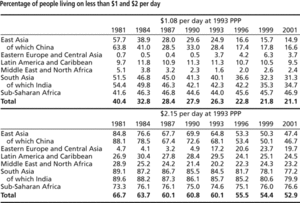‘A pronounced deprivation in well being.’ A. Sen (1985, 1993) argues that what is important to well-being is the ‘capability to function in society’. These capabilities include access to food, shelter, clothing, education, security, and good health: capabilities which the poor lack. The poor also lack a voice in society, are vulnerable to risk, and are powerless.
‘Over the past 30 years, the world has undoubtedly registered impressive gains in the average life expectancy of its population—from 60 years at birth, to 67 years. Infant mortality has decreased substantially—from 96 to 56 per 1,000 live births’ (Bidwai (2006) Development Dialogue 47, 31). The 2005 UN Human Development Report explains that these changes are partly a product of falling child death rates, improvements in access to water and sanitation, and global immunization. There is also evidence that literacy levels have risen.
There have been setbacks: eighteen countries registered lower scores on the HDI in 2003 than in 1990. Twelve of these are in sub-Saharan Africa and the former Soviet Union accounts for the other six (ibid.). Chuhan (Glob. Monitoring Re. 2006) adds that ‘over three-quarters of a billion people, many of them children are malnourished. Each year nearly 11 million children die from malnutrition or disease before reaching their fifth birthday…and over half a million women die every year in childbirth from lack of appropriate health care, malnourishment, or disease. More than 100 million children of primary school age, the majority of them girls, do not attend school.’
Poverty is not restricted to the developing world: in inner London in 2006, 51% of children were living in poverty and US Census Bureau records show that the proportion of Americans living in poverty rose between 1974 and 2004, from 11.2% to 12.7%. For the period 2000–2005 the Cuban infant mortality rate was 8/000; the same as for the USA (World Mortality Report, 2005). ‘The only positive interpretation that can be given to this picture of poverty and inequality in the developed world is that many of the poor are recent arrivals from even poorer places in Africa, Asia and Latin American countries’ (Gilbert (2007) Geog. Compass 1, 3).

Source: Chen & Ravaillon (2004)
http://povertydata.worldbank.org/poverty/home World Bank Poverty and Equity data.
www.undp.org/poverty/ Official website of the United Nations Development Programme.
http://hdr.undp.org/en/reports/global/2005 Oxford Poverty and Human Development Initiative.
http://hdr.undp.org/reports/global/2005/ The Human Development Report.
Inability to afford an adequate standard of consumption. What this standard is, once income is sufficient to avoid actual starvation, is subject to much variation between countries and over time. Economists have differed as to whether poverty should be considered in absolute terms, as falling below some fixed minimum consumption level, or whether it should be defined in relative terms, with poverty meaning the inability to afford what average people have. If an absolute standard is accepted, it is at least conceivable that technical progress will eventually lift everybody above the poverty line. If poverty is relative, then poverty will be very difficult to eliminate. See also poverty line; poverty trap.
- argon–potassium method
- Argos DCS
- argument
- argument from analogy
- argument of a complex number
- argument(of a complex number)
- argument of a function
- argument(of a function)
- argument of perihelion
- argumentum ad
- Argyre Planitia
- Ariane rocket
- Arianespace
- Arian heresy
- Arianism
- arid geomorphology
- aridic moisture regime
- aridisol
- aridisols
- aridity
- aridity index
- Ariel
- Ariel satellites
- Aries
- Aries, first point of